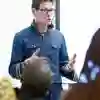



This is your chance to make a real difference to the next generation of thinkers, makers and dreamers.
Our innovative two-year degrees provide an opportunity to gain a first degree while focusing on your future ambition of becoming a teacher. This course is ideal if you're convinced you want to teach History to secondary school children, if you're thinking of changing your career, or if you're looking to gain a specialist first degree.
You’ll explore curriculum, learning, teaching and what inspires young people to grow and flourish, with a focus on History as a subject specialism.
About this course
Be part of the lasting impact that education has on people's lives on this accelerated route towards a PGCE or taking on a teaching role in schools.
You'll learn about children's and young people's development and needs. And explore education theory, research, policy and practice.
Opportunities to reflect on professional practice include a work-based module at the end of your first year. As well as visits to diverse learning environments such as mainstream and special schools, alternative provision, galleries and museums. You can also study towards an accredited Forest School certification, so vou can lead children's learnina outdoors.
Our extensive network of 600+ charities, education-related organisations and schools gives you invaluable learning experiences such as guest lectures and professional practice observations. As well as opportunities to take your placement in the UK or overseas.
Working with History specialists in the School of Humanities, you'll explore a range of eras focusing on topics relevant to the school curriculum. So you'll develop subject knowledge relevant to the classroom while also exploring History at degree level.
Join us for a future of making history
Module options
The course consists of 180 credits per year. Most modules are 20 credits, meaning you'll study nine modules each year. Some longer modules, such as a dissertation, are worth more (e.g. 40 credits). In these cases, you’ll study fewer modules - but the number of credits will always add up to 180 credits.
Filters
Introduction to Education
This module sets the scene for the programme, starting with your own background and experience and exploring what education means, how it differs from schooling and key concepts and approaches. It will also help you to develop the academic skills necessary for your degree programme.
core
20 credits
Education Theory
This module explores the “Big Questions” in Education, drawing on key thinkers and theorists from across many periods of history and diverse locations across the globe. It will prepare you for undertaking your own research later in the degree, and provide broad horizons to challenge some of your preconceptions and expectations about education.
core
20 credits
Reflective Practice 1
This module provides opportunity to engage in an extended period of work experience (paid or voluntary) and reflect on the learning environment in which you are based. Whether in a location local to home, or visiting a more distant place, there is flexibility to explore your interests as well as deepening your understanding of learning and children’s development to prepare you for applying for a teacher-training course.
core
40 credits
Education Specialism
Following focused input from your lecturers, this module provides the opportunity to explore a particular topic of interest to you, supported by a tutor. Whether you want to learn more about child development, pedagogy, approaches to behavior management or an aspect of the school curriculum, you will be supported to develop critical insights into real life practice.
core
20 credits
History of Freedom
What does it mean to be free and how has the answer to this question changed over time? In ancient and medieval times, there was no expectation of individual freedom as we understand it today, rather there were degrees of ‘unfreedom’ such as slavery, serfdom, or vassalage. Later, in the age of empire, race determined who could be enslaved, and the slave trade’s legacies of racism persist into the present day: the civil rights movements and the struggle against apartheid are known as some of the most prominent recent fights for freedom. Nonetheless, the idea of freedom has far broader connotations, and you will also have the flexibility to explore diverse issues such as religious, cultural or personal freedoms.
core
20 credits
History in the News
What are the historical roots of what is happening now? You will help to shape the course by identifying some of the most pressing and interesting issues of the world today. We will then work together to research different perspectives on these themes by finding out historical background and historical parallels that help to explain them. The decision as to what we should explore together lies in your hands.
core
20 credits
World War Tudors: Rethinking British History
Why are TV programmes so obsessed with certain episodes in British history such as the Tudors and the world wars? What idea of Britain is conveyed when we focus on a narrow range of stories like Boudicca’s fight against Rome, victory at Agincourt, Henry VIII’s wives or the Battle of Britain? What gets left out of British history in these simplified versions of the past? This module will invite you to critique popular culture, such as television documentaries or computer games, and to create different fresh ideas for how you think the public could engage with an aspect of the past that inspires you.
core
20 credits
Human Worlds
How have humans shaped their environment, and how has the environment shaped them in return? These questions have controlled how and where we live. The availability of resources has encouraged migration and movement from the trade routes of the Silk Road across Asia to the imperial web of coaling stations that developed for the projection of naval power. How do cities grow – like St Petersburg, Delhi or Paris, built and rebuilt that has affected how generations of inhabitants later would live their lives?
core
20 credits
Reflective Practice 2
In this module you will hone your skills in reflective practice, reflecting on contributions from a variety of speakers and experts in addition to visits to a range of learning settings for children of different ages. This will include both formal and informal learning settings.
core
20 credits
Our facilities

Watchlist
Michelle Wormald
Course overview
2 mins
A degree that goes beyond the classroom
Course montage
1 min
Rewilding Reading
Course Highlight
9 mins
Life on campus
University life
2 mins
The Gold Standard for Teaching
University life
1 min
Featured academics
You'll benefit from the outstanding support of academic staff who are experienced education practitioners.
Our research is driven by the belief that education can challenge inequalities and injustices in society, and seeks social and educational change to enhance fairness, equity and social justice.

Shelley Hindley
Lecturer
Shelley has 10 years experience in secondary schools including as Head of French and Head of German. She was an assessor for the General Teaching Council’s Teaching and Learning Academy and co-led Teacher Effectiveness Enhancement Programme courses.

Holly Smith
Lecturer
Holly has over 10 years’ experience teaching in secondary schools. Her research interests include reading for pleasure and drama as an engagement tool for learning.
Entry Requirements
What do I need?
This course is currently available through Clearing, which means our entry requirements are a bit different to what they would normally be.
At Hull, you're a name not a number. During Clearing, we look at all of your qualifications and experience, not just your academic grades. We may be able to offer you a place whatever your situation. Get started by completing our eligibility checker, and find out immediately if you could study at the University of Hull.
Have questions? Our admissions team will be happy to help.
Fees & Funding
How much is it?

Future prospects
After you graduate, you can go on to start initial teacher training leading to Qualified Teacher Status (e.g. PGCE).
Graduates also pursue other postgraduate studies, work as home education tutors, education consultants, teach abroad, or take up educational roles in the arts, heritage or local government sectors.
Become part of the next generation of futuremakers
Like what you've seen? Then it's time to apply.
The standard way is to apply through UCAS. This will give you the chance to showcase your skills qualities and passion for the subject, as well as providing us with your academic qualifications.
Not ready to apply yet?
Visit our next Open Day, and see all that the University of Hull has to offer. Talk to our lecturers about your subject, find out what university is really like from our current students, and take a tour of our beautiful campus and amazing facilities.
You may also be interested in...
100% employability (Teacher Education) UK domicile full-time first degree leavers; Higher Education Graduate Outcomes statistics, for the academic year 2022/23, published by the Higher Education Statistics Agency June 2025.
Education is ranked Joint 1st in the UK for Value Added Score. The Guardian University Rankings 2026.
All modules presented on this course page are subject to availability and this list may change at any time.